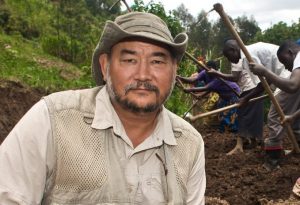
John D. Liu started his career as a journalist and cameraman, covering politics, economics, and culture. In 1995, he began documenting the Loess Plateau in China, a massive landscape that had been destroyed by poor agriculture practices over the course of centuries. He watched and filmed as the landscape––and the people––came back to vibrant life over decades, through an intensive process that involved soil science, engineering, hydrological restoration, and the participation of local communities. The result was a living, lush, and sustainable ecosystem that produced more food with less land in agricultural production.
Liu has devoted his life to ecological restoration, both as both a filmmaker and an activist. He is the founder of Environmental Education Media Project and Ecosystem Restoration Camps
You can watch his films on Vimeo and YouTube, and you can learn more at Academia.edu.

1’59 how John came to devote his life to documenting land restoration
2’30 China’s Loess Plateau: “the most eroded place on earth”
6’11 the Loess soil and how it was created
8’45 the transformed landscape
9’45 the process of transforming landscapes to allow water to flow and infiltrate
11’02 making terraces in the land
12’28 the agricultural yields increased by reducing the percentage of land in cultivation
13’47 changing from a “production” to a “value” perspective
14’14 the importance of growing food with plenty of nutrition, which can only be done in healthy soils
15’08 self-replicating, living systems as the basis of agriculture
17’13 the landscape represents our consciousness
18’27 industrial agriculture accellerating the process of degradation
20’34 changing earth temp by restoring the water cycle
21’06 having an accurate conversation about global temperature
21’46 bad consequences of environmental destruction and understanding their interconnection
23’10 “shelter belts” and the great green wall of China
25’14 understanding symbiosis, and that we are part of planetary life systems
25’34 pollinators
26’11 harmony grace and love
26’43 eco restoration camps––what they are and how they work
30’06 we are at a turning point
30’40 if our money reflected ecological function we’d have lots of money
31’08 science, logic, ethics, morality, and economy can line up when we restore ecological function



Subscribe:
Apple Podcasts
Spotify